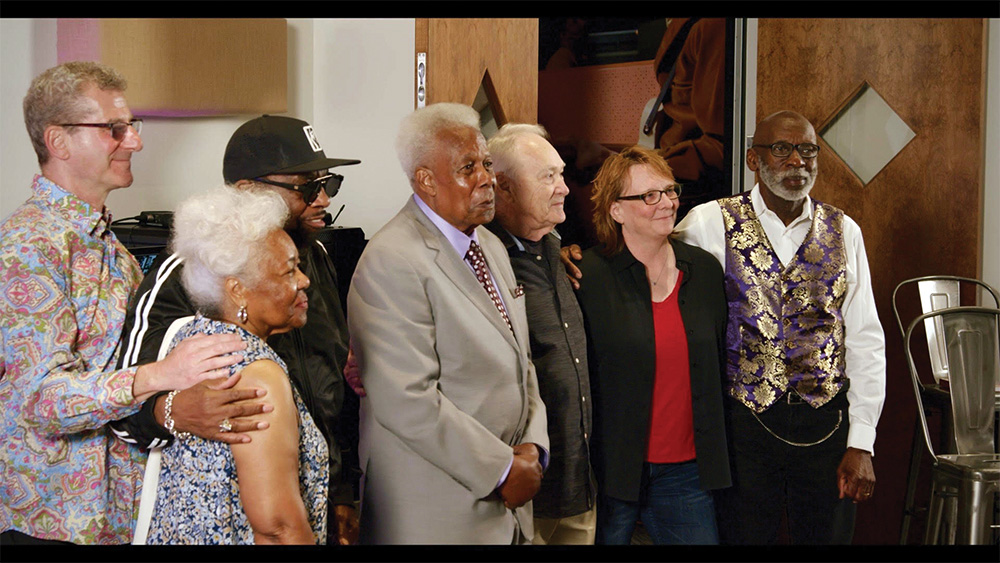The air was charged last Friday night at the Stax Museum of American Soul Music, as five of Stax Records’ most valuable players gathered together to answer questions and speak their minds. The sold-out event was first and foremost a celebration of Written in Their Soul: The Stax Songwriter Demos, Craft Recordings’ seven-CD compilation (reviewed last week in the Memphis Flyer) featuring 140 never-before-heard recordings made in the studio’s back rooms, when songwriters made reference tapes of their compositions. Those demos would ultimately be filed away among the holdings of East/Memphis Music, the label’s publishing company, with the best serving as blueprints for full-on studio recordings by Stax artists.
Hence, it was not in their capacity as Stax performers that William Bell and Eddie Floyd appeared last Friday, but as some of the label’s best songwriters. They were joined by Deanie Parker, Bobby Manuel, and Henderson Thigpen, fellow masters of the craft, in a kind of summit of the scribes. The panel was rounded out by wordsmith Robert Gordon and the visionary record producer who’d first conceived of the release, three-time Grammy Award-winning producer Cheryl Pawelski.
Although the museum, built according to the original building’s plans, always conveys a sense of the bustling Stax studios and offices to the casual visitor, this historic gathering made it more palpable, as the panelists discussed their days in those very halls when Stax was at its zenith. It was a veritable money machine in its heyday, but, as Robert Gordon explained, that money wasn’t just from record sales. East/Memphis Publishing oversaw the equally lucrative income stream of song royalties. For songwriters like those gathered at the museum Friday, those royalties translated into “mailbox money.”
Henderson Thigpen was perhaps the purest expression of the songwriter’s ethos that evening. The others were involved with Stax in several capacities besides songcraft: Deanie Parker headed the label’s public relations and was later known as the primary conceptualizer of the Stax Music Academy and associated museum, Bobby Manuel was an ace session guitarist, and Bell and Floyd were stars, the most public voices and faces of Stax. Thigpen, however, focused on writing with laser-like determination, always keeping “a pen in one pocket and two notepads in the other pocket,” as he explained.
He described writing the Shirley Brown hit, “Woman to Woman,” noting the care with which he sang the demo to show Brown how the opening monologue had to be delivered. Then the museum’s executive director, Jeff Kollath, cued up the demo featuring Thigpen’s vocals, sung from a woman’s point of view, seeming to take the songwriter by surprise. He winced good-naturedly as his haunting voice from half a century ago filled the room, then took a moment to point out his wife in the audience. His only regret about the master recording of No. 1 R&B hit, he said, was that it didn’t open with the sound of a ringing telephone.
The room lit up when “Dy-No-Mite (Did You Say My Love)” by composer Mack Rice was played; while the song was recorded and released by the Green Brothers, all agreed that Rice’s high-spirited delivery on the demo, complete with whistles, could not be topped. Indeed, the late Mack Rice was a recurring presence at the event. So were prolific songwriters Bettye Crutcher, who passed away last October, and Homer Banks, who died in 2003.
The set’s art director and designer, Memphis’ own Kerri Mahoney, was in the audience and noted afterwards how stunned she was that so little memorabilia was preserved from those days. She’d had little to work with, she said, though her work ultimately resulted in a richly illustrated and smartly designed package.
Pawelski, for her part, sat back and let the legends speak, but eventually Gordon asked her to tell the long tale of the collection’s genesis and realization. When she worked for Concord Records (of which Craft is a subsidiary), she learned of the demos kept by East/Memphis. But, having been archived haphazardly, many were buried in long, uncatalogued tapes on which completely unrelated demos also appeared. Over 17 years and a few career changes culminating in the founding of her own label, Omnivore Recordings, Pawelski gradually listened through nearly 2,000 hours of audio in her quest to identify the lost gems of Stax. She was clearly elated that her baby was now out there in the world.
